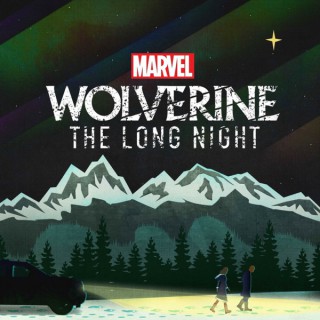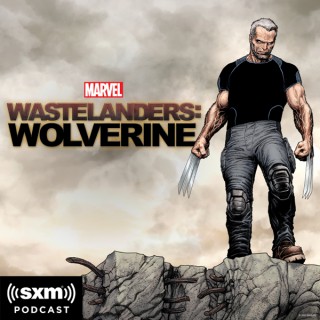The History of Marvel Comics: Black Panther
Follow The History of Marvel Comics: Black PantherAn exploration into the comic book origins of Black Panther via conversations with the creators who have shaped T’Challa’s journey, a celebration of the Afro-Futurism of Wakanda, and the worldwide social impact of the character. Hosted by author Nic Stone.
- Sep 12, 2022 LATEST EPISODE
- infrequent NEW EPISODES
- 32m AVG DURATION
- 10 EPISODES
More podcasts from Marvel & SiriusXM
Latest episodes from The History of Marvel Comics: Black Panther

Marvel's Wastelanders: Doom, starring Dylan Baker as Doctor Doom, available today on the SiriusXM app, Marvel Unlimited Podcasts on Apple Podcast, and everywhere you get your favorite podcasts. Directed by Jade King Carroll. Original sound design and music by Mark Henry Phillips. Story by Mark Waid. Written by Mark Waid and James Tae Kim. Learn more at marvel.com/wastelanders

Squirrel Girl has taken down Thanos and Doctor Doom – but now she faces something far more terrifying… living authentically. Empire State University college student, Doreen Green, has recently been outed as a Super Hero – The Unbeatable Squirrel Girl! Hoping to unify her personas in the public eye, Squirrel Girl has created a new student radio show on ESU's own college station. With the help of her best girl-friend, Nancy Whitehead as producer, and her best squirrel-friend, Tippy-Toe in the booth; Doreen is ready to help people more people than ever with her greatest Super Hero advice. And when the going get rough, she can always lean on her heroic friends: Iron Man, Spider-Man, Chipmunk Hunk, Koi Boi and Brain Drain. However, with a call-in show comes caller anonymity and not all the folks on the line want help – some want to crime – and crime hard! When a suspicious caller, wreaks havoc on New York City, Squirrel Girl and her friends will have to put their heroics to the test and prove that once and for all Doreen Green is the UNBEATABLE Squirrel Girl. It's time to kick butts, and eat nuts! MARVEL'S SQUIRREL GIRL: THE UNBEATABLE RADIO SHOW! Milana Vayntrub as Squirrel Girl and featuring performances by Crystal Lucas Perry (Nancy Whitehead), Leo Sheng (Koi Boi), Davied Morales (Chipmunk Hunk), Erica Schroeder (Tippy T. Squirrel), Tina Benko (Rachel Oskar), and Peter Hermann (Brain Drain). Directed by Giovanna Sardelli. Original music by Justin Huertas and Steven Tran. Written by Ryan North. Learn more at https://marvel.com/SquirrelGirlPodcast

It's 2021 and the Black Panther has become a lot more popular than he's ever been. In fact, Black Panther has done something that no other Marvel hero or team has done before: expand beyond the one man behind the mantle, beyond T'Challa, and has created a world of its own: Wakanda-- a land, a people, and a cultural phenomenon. It's here that we'll explore John Ridley's take on the character, as we look back at the seeds that Stan and Jack planted all those years ago, a present that's grown and branched out beyond its own roots, and finally a blossoming future of endless possibilities.

By the time we reach 2016, the Black Panther has experienced decades of adventures, fought countless villains, and teamed up with many of Marvel's mightiest heroes— however, in Ta-Nehisi Coates' run, we find T'Challa struggling to define himself as a person, as a Super Hero, and as a leader of a world power. Far from the swashbuckling adventures of the character's origins, this Black Panther is a ruler with a heavy burden. Ta-Nehisi Coates flips the paradigm on the character and finally puts the expectations of a people on its king. Can he live up to it?

It's 2005, and Marvel has tapped film screenwriter, director, and President of Entertainment of BET, Reginald Hudlin, to write a new Black Panther book. Excitedly, Reggie shares this news with his friends and family. Their reaction? “Who is the Black Panther?” Written by Reginald Hudlin, “Who Is The Black Panther” was Reggie's definitive response to that reaction— building off of previous Panther stories, and reintroducing T'Challa to the world by over-satisfying his community and his own desires for a black Super Hero.

In 1996, Marvel filed for Chapter 11 bankruptcy but the experimental Marvel Knights imprint was the light at the end of the tunnel. And after his first solo series, the Black Panther was in dire need of an upgrade. With the help of Joe Quesada, Mark Texiera and Marvel's first African-American editor-writer, Christopher Priest, the Black Panther was in for the glow up of the century. This is the beginning of the Black Panther mythos we know and love today.

1973 saw Black Panther return to Wakanda, after a brief stint in the US with the Avengers, only to find his kingdom riven by infighting and sedition. Written by Don McGregor with art by Rich Buckler and Billy Graham, Panther's Rage picked up right where Stan Lee and Jack Kirby left off by presenting a counter to T'Challa's crusade in America by establishing Wakanda, and the responsibilities that come with being a king, and the how those two worlds not only differ, but also struggle to coexist.

On April 2nd, 1966, Stan Lee and Jack Kirby debuted Marvel's first Black super-hero, Black Panther, in the pages of Fantastic Four #52 - at the height of the Civil Rights Movement. In this premiere episode, host Nic Stone will deep dive into the complexities of his early adventures and how writers like Roy Thomas elevated the character beyond what readers had seen in a Marvel comic.

Coming 2/14, An exploration into the comic book origins of Black Panther via conversations with the creators who have shaped T'Challa's journey, a celebration of the Afro-Futurism of Wakanda, and the worldwide social impact of the character. Hosted by author Nic Stone. Learn more at Marvel.com/BlackPantherPodcast

An exploration into the comic book origins of Black Panther via conversations with the creators who have shaped T'Challa's journey, a celebration of the Afro-Futurism of Wakanda, and the worldwide social impact of the character. Hosted by author Nic Stone.Learn more at Marvel.com/BlackPantherPodcast















